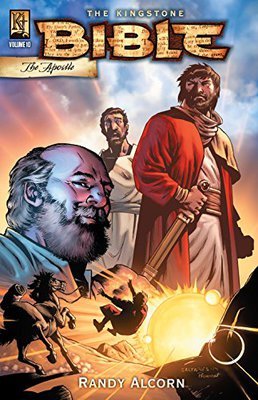Randy Alcorn's Blog, page 162
July 24, 2015
Introducing my new graphic novel The Apostle

The Apostle is my second graphic novel, and is based on the epic life and missionary journeys of the Apostle Paul. I’ve included, with painstaking accuracy (though having to condense), most of what the Bible tells us about Paul, while adding fictional details and dialogue to make the story work as a graphic novel. For instance, based on Paul’s fondness for his friends, it was only natural to portray them talking and joking together.
The biblical content of The Apostle is inspired by God. The added speculative elements are not. My design is never to contradict Scripture—only to fill out the story on these pages.
 I recently read through the finished book. I felt I wasn’t reading a story I wrote, but one which I merely assembled in a creative way (which of course is the case!). Luke is the narrator, which I feel gives the story an immediacy and personal connection that really pays off in the end when he invites the reader to join the beloved characters of the book by turning to Jesus. I was weeping tears of joy at the end, not as a writer, but as a reader. This surprised and touched me.
I recently read through the finished book. I felt I wasn’t reading a story I wrote, but one which I merely assembled in a creative way (which of course is the case!). Luke is the narrator, which I feel gives the story an immediacy and personal connection that really pays off in the end when he invites the reader to join the beloved characters of the book by turning to Jesus. I was weeping tears of joy at the end, not as a writer, but as a reader. This surprised and touched me.
Because it includes a large amount of Scripture, and because the gospel is so woven into the story line and there are many people coming to faith, my prayer is that God might choose to use The Apostle powerfully. I hope that the warmth of the relationships between Luke, Paul, Timothy, Titus and Peter, as well as Paul’s good humor along with his failings, will make it seem real and attractive.
The graphics took two artists, a colorist and a letterer (who’ve worked with Marvel Comics, and who also did the art for my first graphic novel Eternity) over a year to complete. I think they did an amazing job. I’ve loved writing The Apostle, and working with these marvelous artists. I hope you enjoy the results.
If you like my other fiction, I think you’ll like this as much, maybe more. And for sure, you’ll know a young person to share it with!
July 22, 2015
Over 40 Books and Countless Changed Lives

A note from Eternal Perspective Ministries
We love the fact that God uses Randy’s books to change people’s lives in two ways: through the reading of the words and through the giving away of the royalties. Randy writes, "I seek to write with all my heart, as a service to the Lord. By God’s grace, there are over nine million of my books in print, and they've been translated into over sixty languages. It’s fun to know the Lord is using both the books and the royalties to touch lives."
Since its inception in 1990, EPM has given over $7 million in book royalties to ministries around the world. A recent book advance allowed us to disperse significant funds to over three dozen ministries, including Mercy Ships, Voice of the Martyrs, Samaritan's Purse disaster relief, The Seed Company, and many more. We thank God for the privilege of investing in His kingdom!
Here's just a few of the many book responses we've received over the past 25 years.
I read your graphic novel Eternity, and I really liked it. I was at camp this week and felt God working in me through the book. I loved how you portrayed Heaven and Hell in this story. This really made me wonder if I was really saved, and this week I think was the week of my true salvation. — I. A. (age 12)
Your book, Safely Home, played a role in developing my heart for China. After I read the book, I literally wept and found my heart wanting to be part of God’s work here in China. I’ve been here now for almost five years and I must say it’s been an amazing journey and blessing to be here! — D. P.
Other than the Bible itself, few books have changed my actions as quickly as this outstanding little book The Treasure Principle. I read it aloud to my husband and together we made decisions about the money and possessions God has entrusted to our care. These choices have brought us great joy. — F. E.
I just want to take the time and tell you how much your book ProLife Answers to ProChoice Arguments has impacted my life. I have always been prolife but was afraid to speak out because I did not feel like I had the answers. I have learned so much from your book. Thank you for helping me. — P. L.
This book Edge of Eternity has a special place in my heart. I read it many years ago and I can't even talk about it without crying! This book led me to Jesus! It's the second most important book I've ever read and I tell people all the time about Randy's books, especially this one. —R.M.
I've been in a wheelchair since 2000. I've read and heard so many things that I was jaded and didn't want to hear any more. I appreciate your diligent use of Scripture in If God Is Good. You restored my hope in God and His goodness, showing me that I still have purpose. —W.C.
I am almost 12 and my dad is taking me through The Purity Principle. It has really helped me with that issue. And now whenever I am tempted I just remember your words which were “impurity is always stupid and purity is always smart.” —J.P.
July 20, 2015
Why You Can Trust in God���s Provision ��� and Not Worry

Jesus tells us to “Seek first his kingdom and his righteousness, and all these things [what you eat, drink, and wear] will be given to you as well” (Matthew 6:33). Unlike the pagans who “run after all these things” and “worry about tomorrow,” believers are told to follow Christ, live a radical life of faith, and trust God to provide (Matthew 6:25-34).
In this passage, Jesus says that God cares for the birds. Yet birds aren’t created in God’s image. Christ didn’t die for birds. The Holy Spirit doesn’t indwell birds. Birds won’t reign with Christ. But we will! So Christ asks his disciples, “Are you not much more valuable than they?” (Matthew 6:26). If he takes care of the less valuable creatures, will he not take care of us, who are far more valuable?
Of course, the birds provide for their immediate future through labor—building nests and obtaining food for their young. But they don’t maintain one nest in the mountains and another at the beach. Neither do they fill their cellars with freeze-dried worms. Birds do the work that God created them to do; they sing when they work, they don’t hoard, and they instinctively trust their Creator to take care of them. Should we who know God’s grace do any less?
Jesus says, “Accept my sovereignty and goodness, and you won’t have to worry about tomorrow. Trust me.” All of us trust in something. The more dependable the object of our trust, the less we need to worry. The stock market isn’t God, the Wall Street Journal isn’t the Bible, your asset manager isn’t your priest, and financial experts aren’t prophets. (Prophets were put to death when their prophecies didn’t come true!) That doesn’t mean the stock market is bad, but it does mean it’s not trustworthy. It may do well for a day, a month, a year, or even a few decades. But because the stock market is uncertain, it can only produce anxiety when it becomes the object of our trust. God is the only totally trustworthy object. Therefore, he’s the only one who cannot betray our trust.
Why is this truth so hard for us to accept? If we believe that God can create us, redeem us, and bring us through death to spend eternity with him, why can’t we take him at his word when he says he’ll provide for our material needs?
If God calls on you today to share your resources with another, you must not say, “I can’t, Lord, because I don’t know where my own provisions are coming from.” Yes, you do know where they’re coming from. They’re coming from God. You may not know the form this provision will take, but you do know the Source. Like the poor widow who had no cash reserves, you know that God will take care of you, even if there are no visible resources.
If God has control of everything, and God takes care of his children, and God gives everything necessary to those who walk with him; and if you are his child, and you are walking with him—why worry? Worrying never helps anything anyway—but has hurt plenty.
photo credit: Colibri dans son nid via photopin (license)
July 17, 2015
The Sale of Baby Body Parts to Profit Planned Parenthood

For many years I’ve written and spoken about Planned Parenthood, and I’m frequently reassured by people that it’s really a great and loving organization, and how dare I criticize them? For those who still believe this, take a look at this video.
This is what we’ve come to—the sale of baby body parts to profit Planned Parenthood. Check it out and judge for yourself. For those who say they’re horrified to learn this about Planned Parenthood, I say what I’ve said for the last thirty years about all “abortion providers,” including some I’ve spoken with personally—when someone makes their living killing babies, why do we expect them to make moral decisions? In this case, why are we surprised to learn they sell their body parts?
Though the video and facts about Planned Parenthood profiting by selling parts of aborted children are gruesome, in fact, I’m not shocked about them. Why? Because I already knew what was going on in abortion clinics, and the low disregard for ethics by those who work there. I already knew that abortion clinics are lining their pocketbooks by killing hundreds of innocent people every week.
Planned Parenthood states over 90 percent of their services are not abortion-related, but their annual report demonstrates that 329,445 abortions were performed and accounted for 91 percent of their services. [i] This makes Planned Parenthood by far the largest abortion provider in America.
Citizens, schools, and businesses who think of Planned Parenthood as an objective third party acting in the best interests of people need to come to grips with the fact that this organization has tremendous vested interests in marketing abortions.
In 2000, when ABC’s 20/20 dealt with the marketing of fetal body parts, Planned Parenthood president Gloria Feldt sat before the camera condemning these activities. Life Dynamics, the group that brought the illegal activities to the attention of ABC, said:
20/20 was completely irresponsible in not making the viewer aware that all of the wrongdoing described in this broadcast occurred at Planned Parenthood facilities, and that Planned Parenthood is responsible for the national network that supports the trafficking of baby body parts. Ms. Feldt was clearly wanting to disguise this in her interview and 20/20, by its silence, went right along with her. The result is that the viewer was left with the false impression that Planned Parenthood was outraged at these practices rather than a participant in them.[ii]
I hope and pray that God will use these latest “revelations” to cause a great national outcry against Planned Parenthood and the abortion culture, and to motivate Christians to speak out for those who cannot speak for themselves (Proverbs 31:8-9). (Check out this CNN opinion article.)
It is time for the reborn to stand up for the unborn. —Russell Moore
[i] “New Planned Parenthood Annual Report Confirms Abortions Total 91% of Pregnancy Services,” Live Action blog, January 3, 2012, http://liveaction.org/blog/new-planne...- up-91-of-pregnancy-related-services/.
[ii] Press release on 20/20 Fetal Body Parts Scandal, Life Dynamics, March 2000.
photo credit: Our Grinning Baby Boy via photopin (license)
July 15, 2015
On the Wrong Side of History?

A common argument against Christian moral positions that are increasingly unpopular (including, but not limited to: opposition to abortion, gay marriage, sex outside marriage, belief in hell, and only one way to heaven, through Christ): "Get your head out of the sand; look around and see where things are clearly headed! You don't want to come down on the wrong side of history!" This argument comes not only from outside the church, but also increasingly from inside it.
But what does this really mean? That wherever history takes us is right? That the latest trends are always a good direction? That majority opinions are always correct, even when God says otherwise?
When evil becomes popularly accepted in a culture, shouldn't we WANT to come down on the wrong side of history, at least current history? And given the larger picture of God's sovereign rule and the eventual New Heavens and New Earth, won’t history ultimately vindicate God’s Word and God’s Son? Won’t some argue that the Antichrist should be followed because we don't want to fall on the wrong side of history? The opposite is true—following whatever current trends of history crop up can put us on the wrong side of God's plan of redemptive history.
In other words, there’s a lot of sloppy thinking, failure to define terms, and unbiblical worldviews behind this question! It makes a better bumper sticker than a coherent thought, since the current historical drift of thinking is often contrary to God and at odds with His plan of eternal life on a New Earth where "righteousness [not popular opinion or court-of-nine-people's majority opinion] dwells" (2 Peter 3:13).
This discussion between Tim Keller, Don Carson and John Piper is really worth contemplating and sharing with others:
photo credit: Vines and Grapes via photopin (license)
July 13, 2015
25 Years of God's Faithfulness to EPM: An interview with Randy and Nanci Alcorn
Twenty five years ago, Randy and Nanci Alcorn stood at a crossroads. An abortion clinic had recently won a lawsuit against Randy for his participation in peaceful, nonviolent rescues of unborn children, and he could not make more than minimum wage without 25 percent of his income being taken by the abortion clinic. As a matter of conscience, Randy resigned as a pastor of the church he and Nanci helped start thirteen years earlier. It was a job he loved, and the Alcorns depended on it.
The future looked bleak for a while. But what others intended for evil, God intended for good (Genesis 50:20). Those trying circumstances led to the founding of Eternal Perspective Ministries (EPM), a nonprofit ministry that allowed the Alcorns to pursue things close to their hearts.
In this interview, Randy and Nanci recall God’s faithfulness to their family and to this ministry in the years since EPM was founded. —Stephanie Anderson, EPM staff
Take us back 25 years. Your family had just come through a stressful few years. What emotions were you feeling at EPM's beginning?
 Nanci: The prevailing feeling was not knowing what was ahead. We had faith in God and knew He had a plan. But sometimes, speaking from other experiences, that plan isn’t your favorite thing to go through. There were a lot of unknowns and huge question marks about what was in front of us: How were we going to have an income? Would our kids still be able to attend their Christian school? Were we going to lose our house?
Nanci: The prevailing feeling was not knowing what was ahead. We had faith in God and knew He had a plan. But sometimes, speaking from other experiences, that plan isn’t your favorite thing to go through. There were a lot of unknowns and huge question marks about what was in front of us: How were we going to have an income? Would our kids still be able to attend their Christian school? Were we going to lose our house?
Randy: Just your basic, daily uncertainties of life! (Laughs.) I would say that pain and excitement were the prevailing emotions for me. The pain was largely due to the uncertainty Nanci mentioned. Some had to do with the fact I was leaving a job I loved, and some was due to my fellow pastors and elders understandably not agreeing with all our decisions. We were doing something we felt was right, but we knew it was controversial.
Also, there was pain in missing the relationships that came with being on the pastoral staff. We had been at Good Shepherd Community Church from the beginning, as one of the original two pastors and their wives. It was a big loss to step out of that position. We continued attending Good Shepherd —and we're still there and love our church—but we didn’t know what the future held. If you had asked me before this all happened, “What will you be doing twenty-five years from now?” I likely would have said, “I’ll still be a pastor at Good Shepherd.”
The excitement was, “What’s next, Lord?” I knew God was sovereignly at work, and He was doing something good, even though we weren’t sure what that was!
What was the most difficult aspect about beginning your own ministry?
Nanci: We didn’t know anything about a 501(c)(3). One of the hardest parts was trying to get everything set up. It was just Randy and me. I did most of the office tasks. I didn’t know much about bookkeeping or how to do mailings, but I learned how to do them. Those weren’t things I would necessarily have chosen to do.
Also, even though as a pastor you’re in a sense living off of other people’s donations, you don’t think of it that way because you have a job with a salary. So setting up an organization where we’re receiving support was hard for both of us. Randy and I have gladly supported missionaries over the years. But being on the other side was difficult.
Randy: There was a lot of self-consciousness about raising support. To this day, I hate asking for money. But I’m comforted by the fact that in Scripture, Paul can say, essentially, “Here’s our need,” and “Thank you for supporting us” [see Philippians 1:4-5]. I’m also comforted knowing it actually helps people to give them the opportunity to invest in eternity [see Philippians 4:17]. But back then, it was hard. One of the touching things was how a core group of supporters rallied around us and supported us. We’ve never forgotten this. Some of those same people are still giving monthly to EPM. That blows us away.
Why the name Eternal Perspective Ministries?
Randy: Certainly 2 Corinthians 4:18 was very much on my mind: “We look not at things which are seen, but things which are unseen. The things that are seen are temporary. But the things which are unseen are eternal.” That was huge in the decision-making process related to doing the rescuing and civil disobedience, putting our entire financial future in question, and experiencing the controversy that came with it. We did it because we believed God wanted us to and because we were seeking to please Him.
Though missions and prolife work were at the forefront of our thinking, we didn’t yet know the specifics of what the ministry would involve. And I wasn’t sure how to combine both of those into a ministry name without limiting us. With the idea of an eternal perspective being so important to us, it seemed right to call it “Eternal Perspective Ministries” which describes a point of view, not what our ministry does and doesn’t do.
How do you think the experience of starting EPM shaped your daughters, Angela and Karina (then 9 and 11)?
Nanci: Tremendously. We were the kind of parents who didn’t shield them from things. We thought the best way to teach our children how to process difficult things was to do it with them.
The night before the big trial started, our lawyer called and said, “I don’t know why this is happening, but Lovejoy [abortion clinic] said they’ll take you off the lawsuit, and you don’t have to be a defendant. But you have to agree and sign off on it. Obviously, I'd advise you to do that!”
We talked it over with the girls, explaining we had a chance to get out of the lawsuit. We said that if this lawsuit goes through, there might be no more trips to Disneyland, we’d be pinching our pennies, and they might have to leave Good Shepherd School because we couldn’t afford the tuition. We could even lose our house. Randy and I very gently laid it all out in front of them.
Karina’s response was, “Well, I’m thinking if Lovejoy wants you off, then we should stay on!” And Angie nodded in agreement. We would have made the final decision. But we actually brought them into it, and that’s a big deal for a nine and an eleven year old. From that, they understood a lot of things.
 Randy: Years later, Angela and I were riding bikes in a neighborhood where there was a $500,000 house for sale, which at the time in Oregon was a huge house. While we were admiring it, I realized that with all the royalties that came in the previous year, we could have paid cash for it. I asked Angie, “Do you wish we would have done that?” She laughed and said, “Dad! It’s just a house!” Why would we do that, considering what we were doing with the book royalties? Karina and Angela knew the money was going to support missions and Bible translation and to save lives, something far better than raising our standard of living.
Randy: Years later, Angela and I were riding bikes in a neighborhood where there was a $500,000 house for sale, which at the time in Oregon was a huge house. While we were admiring it, I realized that with all the royalties that came in the previous year, we could have paid cash for it. I asked Angie, “Do you wish we would have done that?” She laughed and said, “Dad! It’s just a house!” Why would we do that, considering what we were doing with the book royalties? Karina and Angela knew the money was going to support missions and Bible translation and to save lives, something far better than raising our standard of living.
Nanci: I strongly believe that faith is putting your trust in Christ when you really don’t have all the answers. If our girls didn’t go into this with a lot of question marks, just like we did, how could their faith have grown? We didn’t tell them, “We’re sure we won’t have to pull you out of Good Shepherd School, so don’t worry.” We didn’t know. We could only promise them God would watch over us.
However, within that month, an anonymous donor paid their tuition, and for the rest of their time at the school, it was paid for. What they would have missed if they hadn’t realized how high the stakes really were! If God wanted them to stay at the school, He would have to come through with a financial miracle. And He did.
It’s not like we tested God, or He said, “Here, I’m giving you a house in Tahiti.” But He always took care of us. Karina and Angela both got married the summer of 2001. Karina was just finishing an expensive college, Angela was halfway through nursing school, and we had two weddings to pay for. We were debt-free. How do you explain that? We were living on minimum wage plus my secretary’s salary (which was equivalent to Randy’s). Both girls graduated debt-free and were able to have nice weddings. Our daughters saw all of this provision.
So to answer the question, our daughters are different people having gone through this, and I’m so thankful. I believe they really trust God.
One of the poignant things now is seeing how our girls are modeling some of the ways we parented, with their own children. Four years ago, Angela was told she had a cancerous tumor. (It later turned out to be benign.) She and her husband Dan didn’t hold back with their boys. They explained she was going to have surgery and brought the medical issue to its logical conclusion: mom could die from this eventually. Jake and Ty were 6 and 4 at the time. Obviously their parents were very careful with them. But the boys had an opportunity to pray that God would spare their mom’s life, and He did.
Some people might have felt it was too much to tell the boys. But how could their faith have grown if they weren’t given huge opportunities to trust God?
Randy: On the day of Angie’s surgery, the boys were included in the circle with the elders from their church who came to pray for her. We were there too. The boys prayed along with the rest of us that God would preserve their mom’s life. Now, He could have chosen to not answer that prayer, or answer it differently than they wanted. But the fact is, they were in on it.
What are some specific ways you’ve seen God’s faithfulness to this ministry?
Randy: In twenty-five years, there have only been a half dozen times when the ministry has had financial challenges. Recently it happened three consecutive summers. Even then, it was a great reminder that this ministry has been in the Lord’s hands all along. And as much as I’ve hated to do it, when we’ve had to say, “Here’s our situation,” people have stepped forward, and now it’s been two years since our last financial challenge. We’re incredibly grateful to the Lord for our supporters.
Nanci: And we get letters and emails all the time telling us how the books have blessed people and changed their lives. We’re sitting here in this little corner of Oregon and amazing things are happening all over the world because of this ministry.
Randy: The impact the books have had is way beyond anything we imagined. My favorite spot in my office is a shelf filled with my books that have been translated into more than sixty other languages. Many of them have been distributed all over the world—China, Russia, Indonesia, Albania, Cambodia. A few books are in Hebrew, the Heaven book is in Nepali, and The Treasure Principle is being translated into Arabic. Who would have thought? While we occasionally receive a letter from an international reader, most often we won’t hear from these people. So it’s exciting to anticipate meeting some of them in eternity!
The vast kingdom outreach of the books themselves is incredible. Then there’s the royalty money distributed to God’s Kingdom as a result of the same books. In a sense, EPM is paid, in the form of the book royalties, to have kingdom impact—and we get to give that all away! This is the best of both worlds, and what makes it my dream job, even though it’s at times a challenging one.
I loved being a pastor. But I’ve said many times to my pastor friends that I wouldn’t go back to being one. God made me to do this.
To date, EPM has given away over $7 million just in book royalties to ministries working around the world. When you think of that, what comes to mind?
Randy: I think of all the people reached and helped, churches planted, pastors trained, children fed and given clean water and medical care, the lives saved. There are Bibles in languages that would not have been, at least not nearly as soon, and there are all my books being given away by Operation Mobilization, and the Logos Hope ship that takes my books and many others into ports all over the world, including Muslim countries.
People have asked me, “Do you realize what you could have done with all that money?” My standard response is—and I mean it with all my heart—“Nothing that would have brought us nearly as much joy.”
There isn’t an asterisk next to it. If I had bought a beautiful house with the royalty money, the asterisk would be, “You know, it’s also been a headache whenever something goes wrong and needs repair, and it’s moved our hearts away from God’s kingdom priorities.”
But there’s no asterisk next to the giving. It’s all upside. It doesn’t mean that every dime has been spent perfectly, but we choose the ministries we support carefully. The point is, we know great things have been done with the money to further God’s kingdom and help the needy all over the world.
You’ve just written a comprehensive book on happiness that will be out this October. What part has laughter/humor/joy/happiness played in your life and ministry?
Nanci: It’s huge for both of us. We laugh a lot.
Randy: We do. Laughter not only has a spiritual and emotional and mental effect, but also a physical effect. Studies have been done on this.
We love to laugh with our kids and grandsons, and our close friends Steve and Sue and many others. I find myself laughing with Nanci every day. We laugh at our Golden Retriever Maggie a lot, and at each of the dogs we’ve had. They bring us joy. We watch certain comedies that we find pleasure in.
Laughter is therapy. Many years ago, my assistant Kathy told me she could tell when I was under a lot of stress because I would joke and laugh more to cope with it. It’s true. If you’re facing difficulties, laughter is a gift from God.
I’m convinced—and I say this in Happiness—that Jesus’ laughter will be the loudest and most contagious on the New Earth. We didn’t come up with this thing called laughter; we got it from Him.
Randy, do you see yourself continuing to write more books?
Randy: Yes, I will continue to write more books as God gives me strength, probably as long as my body and mind still function. But I may slow down.
I recently told the EPM board and staff that likely Happiness could be the last of my “definitive” books, which attempt to provide a thorough, detailed perspective on a subject (my previous books of this sort include Money, Possessions and Eternity; ProLife Answers to ProChoice Arguments; Heaven; and If God Is Good). After doing spinoffs related to Happiness, I will likely take on some other medium or small-sized books.
What are your hopes for EPM as we head into the 26th year of ministry?
Randy: More than anything else, I want us to expand the international reach of the ministry. There’s a world of people out there who search online for content in their own languages. It’s exciting to think that someone could Google the Chinese word for Heaven and find an article on our site that’s an extract from the Chinese Heaven book.
With the earthquakes in Nepal earlier this year, I would love to know that some of these despairing people are reading the Heaven book, and those in areas where they again have internet access can get online and read what I’ve written about the hope of Heaven. To me, that’s worth more than anything else.
What is one major lesson you feel the Lord has taught you both through this journey?
Nanci: To trust Him. Not that I've arrived there completely—it’s a life-long lesson He’s teaching me. Borrowing an analogy from The Hobbit, Smaug the dragon had one vulnerable soft spot. Well, God knows all of our soft spots. He’s hit me with a couple things over the last few years that were pretty tender and challenged me to trust Him. Here we are, having just told you all these wonderful things, yet we’re like the children of Israel. They were led out of Egypt and saw all these miracles, and yet repeatedly asked, “God, where are you?”
Randy: God’s sovereignty and Genesis 50:20 have come to my mind many times. Joseph said to his brothers, “You intended it for evil, but God intended it for good to save many lives.” The first large book I did after EPM began was ProLife Answers to ProChoice Arguments. For years, that book was a major resource for prolifers not only for personally responding to prochoice arguments, but also for training other prolifers. Many high school and college students used it to write papers. Ironically, the abortion clinic lawsuits that resulted in my resigning from pastoral ministry ultimately ended up saving the lives of many unborn children—not directly through my efforts, but indirectly through people I was able to influence.
When this all first happened, it was hard to see the good in it. But looking back 25 years later, we see the lessons learned about God’s faithfulness and also the wonderful things He’s done. It’s overwhelming. He is truly a God of sovereign grace, and we love Him for it.
July 10, 2015
Why an Eternal Perspective Changes Everything

Having an eternal perspective is in many ways the key to living a true Christ-following life. Scripture says in 2 Corinthians 4:18, “So we fix our eyes not on what is seen, but on what is unseen, since what is seen is temporary, but what is unseen is eternal” (NIV). If we let this reality sink in, it will forever change the way we think and live.
In our ministry, we encourage believers to look at life differently—like Elisha’s servant whose eyes were opened so he could see the angels surrounding and protecting them (2 Kings 6). It wasn’t that suddenly those angels were there. They were there all along. He finally had the eyes to actually see the invisible realities.
I’m not saying that we’re going to be seeing angels and demons if we have an eternal perspective! What I am saying is we need to ask God to open our eyes to what’s at stake—to the unseen world and the reality of Heaven, our eternal destination.
Most of us see no further than the horizons of this world. To correct our shortsightedness, God prescribes a vision correction that allows us to look through the lens of eternity. Suddenly we realize this present life is but a brief window of opportunity to invest in what will last for eternity.
Knowing that this present world will end and be resurrected into new heavens and a New Earth should profoundly affect our daily behavior. “...You ought to live holy and godly lives as you look forward to the day of God. . . . In keeping with his promise we are looking forward to a new heaven and a new earth, the home of righteousness. So then, dear friends, since you are looking forward to this, make every effort to be found spotless, blameless and at peace with him” (2 Peter 3:11-14, NIV).
If we understand what “a new heaven and a new earth” means, we’ll look forward to it. (And if we’re not looking forward to it, we must not yet understand it.) Anticipating our homecoming will motivate us to live spotless lives here and now.
Joni Eareckson Tada writes in Heaven: Your Real Home,
When a Christian realizes his citizenship is in heaven, he begins acting as a responsible citizen of earth. He invests wisely in relationships because he knows they’re eternal. His conversations, goals and motives become pure and honest because he realizes these will have a bearing on everlasting reward. …He gives generously of time, money, and talent because he’s laying up treasure for eternity. He spreads the good news of Christ because he longs to fill heaven’s ranks with his friends and neighbors. All this serves the pilgrim well not only in heaven, but on earth; for it serves everyone around him.
When we view today in light of the long tomorrow, the little choices become tremendously important. Whether I read my Bible today, pray, go to church, trust Christ through suffering, share my faith, and give my money—actions graciously empowered not by my flesh but by His Spirit—is of eternal consequence, not only for other souls, but for mine.
After all, what will last forever? God. God’s Word. People. Spending time in God’s Word and investing in people will pay off in eternity and bring me happiness and perspective now. This life need not be wasted. In small and often unnoticed acts of service to Christ, we can invest this life in eternity, where today’s faithfulness will forever pay rich dividends.
Not only will an eternal perspective change our actions, it will also change our attitudes. Living with eternity in mind will infuse us with a joy and purpose that can sustain us in daily life, even as we face hard things. Recognizing our future life on a resurrected Earth can help empower us to stick with a difficult marriage, to persevere in the hard task of caring for an ailing parent or child, or to stay with a demanding job. Moses stayed faithful to God because “he was looking ahead to his reward” (Hebrews 11:26).
Christ-centered righteous living today is directly affected by knowing where we’re going and what rewards we’ll receive there for serving Christ. After all, if we really believe we’re going to live forever in a realm where Christ is the center who brings us great joy, and that righteous living will mean happiness for all, why wouldn’t we choose to get a head start on Heaven through Christ-centered righteous living now? Do we really want to miss out on the true happiness that Jesus offers us here and for all of eternity?
Father, you tell us not to fix our eyes on popular culture, not on fleeting accomplishments and wealth, but upon what is eternal, what will still matter a billion years from now. Give us the eyes of faith, and remind us to focus on you, our soon-returning Savior, and on eternity with you that awaits us.
July 8, 2015
How Does the Bible Present Marriage?

Last month, Nanci and I celebrated 40 years of marriage. I love Nanci more than ever and I thank God for her as a best friend and soul-mate. Earthly marriage is a gift from God. It’s also a shadow, a copy, an echo of the true and ultimate marriage between Christ and His bride.
In her latest video, Julia Stager shares some great thoughts on how the Bible presents marriage, from beginning to end. (Congratulations to Ryan and Julia, who will be getting married this September!)
photo credit - via photopin (license)
July 6, 2015
The Modern Man���s Cycles of Laziness

The Peter Pan Syndrome: Men Who Never Grow Up—a book published in 1983—coined the term now used of immature adults, men especially. Sometimes it’s a thirty-year-old man who won’t stop playing video games to read to his children. Or a forty year old who can’t talk to his teenage son about drugs because it would distract him from the playoffs. Or the guy who won’t go to church with his family because he stayed up too late watching TV.
Scripture has much to say about the immaturity that results specifically in laziness. “If a man is lazy,” says Ecclesiastes, “the rafters sag; if his hands are idle, the house leaks” (10:18). Proverbs 20:4 says, “A sluggard does not plow in season; so at harvest time he looks but finds nothing.”
But God intends men to grow up, accept responsibilities, and mature spiritually. Once we understand the problems of immaturity and laziness, both in our own lives and our families, we can better address them. I appreciated this article by Paul Maxwell that explores five vicious cycles which perpetuate male inactivity:
The Complicated Life of Lazy Boys
The modern man has a major branding crisis. Most sum him up in one word: lazy. There are different ways to pronounce the word — dependent, wasteful, inept, ungrateful, complacent, unworthy, unimpressive, undisciplined — all with one root: the failure to do. Avoid work, and aim for the bare minimum.
Cycles of laziness eventually turn into cycles of violence. As our muscle for self-denial in work atrophies through inactivity, our ability to deny ourselves in relationships weakens as well. The seed of abusive inclinations is embedded in the selfishness of our laziness. A man who dishonors himself will eventually dishonor others (Proverbs 18:9).
Male laziness, though, is both misunderstood and underestimated by most. Until we understand laziness, we will never be able to work well. We have tried yelling at and mocking men, and that has not worked often or for long. Instead, let’s look at the complexity of laziness to see the deeper business underneath it and how the gospel heals and empowers lazy men.
Read the rest at Desiring God.
photo credit - via photopin (license)
July 3, 2015
Thoughtful Questions for Us All to Consider about Gay Marriage

I encourage you to read through this great post by Kevin DeYoung, then consider sharing it. I also highly recommend Kevin's recent excellent book What Does the Bible Really Teach about Homosexuality?
40 Questions for Christians Now Waving Rainbow Flags
For evangelicals who lament last Friday’s Supreme Court decision, it’s been a hard few days. We aren’t asking for emotional pity, nor do I suspect many people are eager to give us any. Our pain is not sacred. Making legal and theological decisions based on what makes people feel better is part of what got us into this mess in the first place. Nevertheless, it still hurts.
There are many reasons for our lamentation, from fear that religious liberties will be taken away to worries about social ostracism and cultural marginalization. But of all the things that grieve us, perhaps what’s been most difficult is seeing some of our friends, some of our family members, and some of the folks we’ve sat next to in church giving their hearty “Amen” to a practice we still think is a sin and a decision we think is bad for our country. It’s one thing for the whole nation to throw a party we can’t in good conscience attend. It’s quite another to look around for friendly faces to remind us we’re not alone and then find that they are out there jamming on the dance floor. We thought the rainbow was God’s sign (Gen. 9:8-17).
If you consider yourself a Bible-believing Christian, a follower of Jesus whose chief aim is to glorify God and enjoy him forever, there are important questions I hope you will consider before picking up your flag and cheering on the sexual revolution. These questions aren’t meant to be snarky or merely rhetorical. They are sincere, if pointed, questions that I hope will cause my brothers and sisters with the new rainbow themed avatars to slow down and think about the flag you’re flying.



